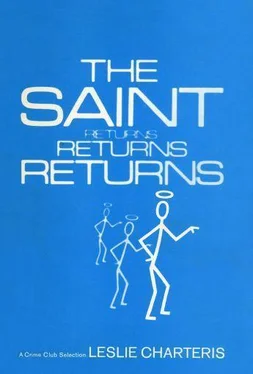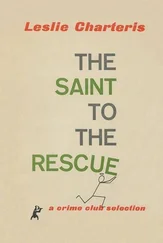Leslie Charteris - The Saint Returns
Здесь есть возможность читать онлайн «Leslie Charteris - The Saint Returns» весь текст электронной книги совершенно бесплатно (целиком полную версию без сокращений). В некоторых случаях можно слушать аудио, скачать через торрент в формате fb2 и присутствует краткое содержание. Город: Garden City, New York, Год выпуска: 1968, Издательство: Crime Club by Doubleday, Жанр: Крутой детектив, на английском языке. Описание произведения, (предисловие) а так же отзывы посетителей доступны на портале библиотеки ЛибКат.
- Название:The Saint Returns
- Автор:
- Издательство:Crime Club by Doubleday
- Жанр:
- Год:1968
- Город:Garden City, New York
- ISBN:нет данных
- Рейтинг книги:5 / 5. Голосов: 1
-
Избранное:Добавить в избранное
- Отзывы:
-
Ваша оценка:
- 100
- 1
- 2
- 3
- 4
- 5
The Saint Returns: краткое содержание, описание и аннотация
Предлагаем к чтению аннотацию, описание, краткое содержание или предисловие (зависит от того, что написал сам автор книги «The Saint Returns»). Если вы не нашли необходимую информацию о книге — напишите в комментариях, мы постараемся отыскать её.
The Saint Returns — читать онлайн бесплатно полную книгу (весь текст) целиком
Ниже представлен текст книги, разбитый по страницам. Система сохранения места последней прочитанной страницы, позволяет с удобством читать онлайн бесплатно книгу «The Saint Returns», без необходимости каждый раз заново искать на чём Вы остановились. Поставьте закладку, и сможете в любой момент перейти на страницу, на которой закончили чтение.
Интервал:
Закладка:
Blagot gulped.
“So now,” Simon announced, “you will take us to your friend, Molière. If you please.”
5
“Oh, brave old world, that hath such creatures in it.” Such was Simon Templar’s reflection on his first view of Molière’s Musique à Go-Go. The small narrow shop was a churning three-dimensional kaleidoscope of squirming and twitching teen-agers in boots, lavishly bell-bottomed trousers, miniskirts, yellow checked jackets, and Edwardian neckwear. Like victims of tarantism, they could not rest even in a place which was not meant for dancing but for the sale of phonograph records. The savage sounds which moved them issued from three auditioning booths in the rear of the store, each screaming out the agony of a different disk. On the walls hung electric guitars, bongos, radios, and television sets. A couple of exhausted female clerks had apparently long ago given up trying to keep any kind of order, and contented themselves with watching the door in an effort to keep anybody from stealing anything.
Blagot shoved his way through the jerking crowd toward an office which looked out on the rest of the shop through a large window. Simon took Smolenko’s hand to pull her up ahead of him when it appeared they would be separated in the crush. It was a surprisingly soft, warm hand, but it abruptly denied him the pleasure of any prolonged contact.
Ivan was so fascinated with the miniskirts that Igor had to be sent back to fetch him through the mob.
“Colonel Smolenko,” Blagot said to Simon, ushering him into the little office, “allow me to present Comrade Claude Molière.”
If Molière had believed that the Smolenko party had been recently despatched by a radio-controlled bomb, he did not betray the fact. Unfortunately, it was most likely that he would have been aware of the failure by now in any case. He was a birdlike man of about thirty-five, with a hooked beak and glittering black eyes, and his twittering nervousness seemed more a permanent characteristic than the result of a surprise confrontation.
“Colonel, Colonel,” he said, jumping to his feet and extending a moist, delicate hand, “what a pleasure. What an honor.”
The Saint shook the hand coolly.
“My secretary, Comrade Malakov.”
“Comrade.”
“Comrade,” said the real Smolenko without enthusiasm.
Simon motioned her to one of the wooden chairs.
“My men will remain outside,” he said with a wry smile, “keeping an eye on the quaint diversions of your country.”
“My apologies, Colonel. At least in here the sound is not deafening.”
“It does not matter. I am a man of few words and good hearing. I am sure you have many more interesting things to tell me than I could possibly tell you.”
Molière almost visibly squirmed before the threatening steel points of the Saint’s eyes.
“Ah, Colonel, no,” he protested deprecatingly, looking as if he would have liked to change the subject entirely.
Simon was kind enough to help him. Glancing around the room, his eyes had settled on a bottle of a curiously spiraled shape which stood on a shelf between piles of catalogues.
“Grand Abrouillac,” Molière said observantly. “A most distinguished liqueur which may be new to you.”
“I know of it,” said Simon, studying the label. “It does not travel. I was not aware that it was ever exported from Switzerland.”
“You are a connoisseur,” Moliere said with approval. “A business friend supplies me. Damaged though it may be from its trip down the Alps, you may be surprised at its quality. May I pour you a glass? And your charming secretary, of course.”
“Thank you, no. We have just had champagne at our hotel.”
“Ah, Colonel,” Molière gushed, winking, “champagne. You know how to live.”
“I try,” said the Saint. “It seems to be increasingly difficult these days.”
Molière, feeling the pressure applied once more, shriveled a bit. His laugh was weak.
“And now,” Simon said brusquely, “to business. In Moscow we were struck — I might almost say shattered — by the excellence of your miniaturized equipment. Do you make it yourself?”
Molière hesitated, almost stammered.
“Uh... no.”
“Who does?”
“Ah... the firm of Grossmeyer, Cardin et Fils. Of Zurich.”
“Zurich. Good.”
Simon turned to Smolenko.
“Malakov, what was that thing we liked so much but had a little difficulty with — the lighter or the...”
“The lighter that takes pictures?” Molière interrupted. “A charming toy. It has given you difficulties?”
“One could hardly call them difficulties.”
Simon waited to see whether his ambiguous statement would bring additional sweat to the shop owner’s brow. It did. Then he went on:
“A tendency to jam temporarily after several exposures. These things are not my field. They are handled on a lower level. But as long as I am here I thought...”
“Colonel, I am sure the difficulties of which you speak must have involved only a single defective item or so. Our tests...”
“We cannot afford even one defective item. I trust you will see to the prevention of such oversights from now on.”
“Certainly, Colonel. Absolutely.”
“May I please have one of the photographic lighters?” the Saint asked.
“Now?” asked Molière with surprise.
“Yes. Now. If you please.”
“But of course,” Molière said with a notable mixture of facial expressions. “One moment.”
He reached into one of the drawers of his desk and fumbled about as Simon turned and watched the display of rocking bodies which crammed the outer room. The Saint’s mind was running in top gear, and his every move was calculated.
“Here, Colonel. With my compliments.”
“Thank you,” Simon said, taking the little burnished steel rectangle. “Is it ready for use?”
“Oh, yes. It is loaded. Ten exposures. You can make a record of your travels.”
“And also test the possibility of faults in the mechanism.”
“Certainly.”
The Saint aimed the camera at Molière and pressed the tiny spring button in the hinge of the lid. Molière fidgeted and laughed.
“But, Colonel, is it wise? Photographs of me and my shop in your camera?”
“I shall not lose it.”
He took a picture of Smolenko, then he turned in his chair and made two shots of the dancing crowd beyond the window. He turned back and clicked the device again in Molière’s direction. Molière blanched.
“The light here is poor,” he said.
“An espionage camera which will not make photographs in ordinary room light?” Simon asked incredulously. “That would be inexcusable. Let us try it out here.”
Molière looked relieved until he discovered that “out there” meant the main room of his shop. Simon snapped Blagot, who seemed to have no fear of the camera and was obviously quite happy to let his comrade, Molière, remain the center of the testy Colonel Smolenko’s attention. The genuine Smolenko appeared bored and vaguely disgusted at the inexplicable antics of her impersonator.
“Anti-capitalist propaganda,” said Simon cheerfully, taking a frame of the dancers. “Fantastique.”
“I have some other equipment to show you,” offered Molière nervously. “Very interesting.”
“Not as interesting as this bizarre spectacle, surely. Just one moment. When I have finished the roll.”
Turning for his next shot, the Saint muttered to Igor in English, pushing him firmly in the direction of the back of the shop.
“Watch that door. Stop Molière if he tries to get away.”
The choreomaniacs were reaching heights of rhythmic abandon rarely seen north of Nigeria. It was quite understandable that a travelling Russian should want to preserve a few images of such exotic native customs with which to regale the folks back home. But Comrade Molière did not seem to sympathize with the desire. His dislike of the whole business became more and more obvious as Simon counted off his photographs.
Читать дальшеИнтервал:
Закладка:
Похожие книги на «The Saint Returns»
Представляем Вашему вниманию похожие книги на «The Saint Returns» списком для выбора. Мы отобрали схожую по названию и смыслу литературу в надежде предоставить читателям больше вариантов отыскать новые, интересные, ещё непрочитанные произведения.
Обсуждение, отзывы о книге «The Saint Returns» и просто собственные мнения читателей. Оставьте ваши комментарии, напишите, что Вы думаете о произведении, его смысле или главных героях. Укажите что конкретно понравилось, а что нет, и почему Вы так считаете.












